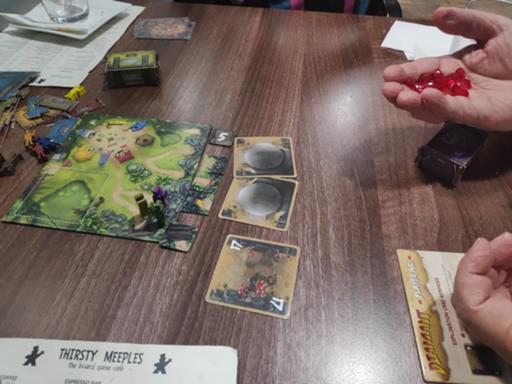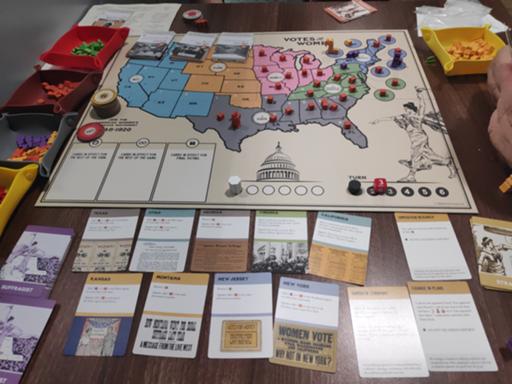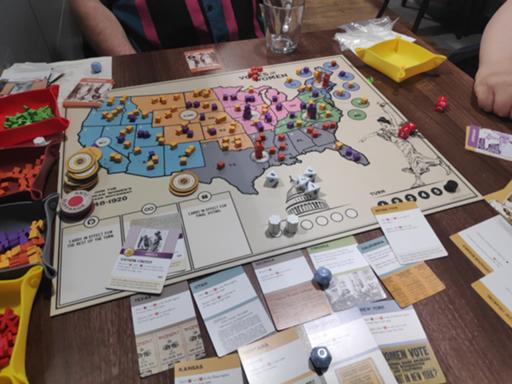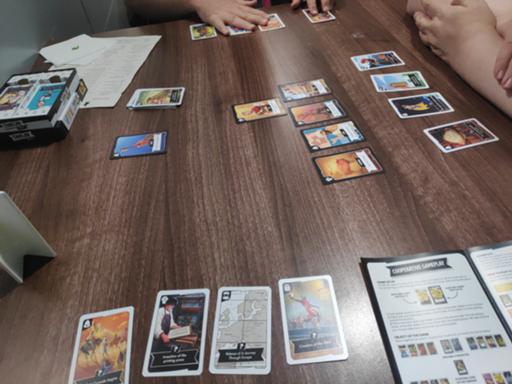Back to the boardgame café.
To start, Diamant/Incan
Gold, which
I've never taught before (and only very rarely played with the
physical bits). The cardboard chests were in very poor shape,
something we see quite a bit here with popular games that get heavy
use. I still had a good time, but I think it would be better with more
than three players.

The main event of the evening,
Votes for
Women – which
is very much a theme that interests me, but fell rather flat, for
several reasons.

First, and I suppose this is inevitable with any card-driven wargame
right back to Twilight Struggle, is what I call the historian's irk.
A few cards have prerequisites, but mostly you can just play an event
when you want to. But, well, Sojourner Truth or Elizabeth Cady Stanton
didn't pop up out of nowhere; they acted when they did, and they had
the effect that they did, because of the context in which they were
acting.
Second, having a "Suffragist" player and an "Opposition" player
reduces the very complex arguments to two sides, and gives them both
human faces. What about the splits among the suffragists over whether
black people should be allowed to vote? Can there really be said to
have been a concerted "opposition" rather than a bunch of individuals
defending their own privilege? I realise that a more realistic game
would be vastly longer and more complex, and the idea is to give a
quick introduction to the period and some of the issues, but it felt
to me too simple to be useful – perhaps, to be fair, because I'm
already broadly familiar with the history.
Third, there's a two-stage process for victory: get enough markers in
Congress to get the Nineteenth Amendment passed, and then get enough
states to ratify it. If Congress doesn't pass it, the Opposition
straightforwardly wins, and the Opposition player went all-out on
that, largely abandoning the battleground of the states in favour of
the sure victory. That's fair enough as a strategy, but the process of
getting those Congress markers into or out of play is inevitably
luck-based, and I was reminded of London Dread which we played some
years ago – it's all very well to say "build up your pool of dice and
rerolls so that you can have a better chance of victory", but if the
dice don't cooperate, it feels as though your win or loss wasn't
really your own doing after all.
Also calling your orange pieces "red", particularly when there are
actual red pieces in the game, just irritates me.
I wouldn't be utterly opposed to playing this again, but I didn't
enjoy it much.

Timeline
Twist, the
new iteration on Timeline, was quite divisive. It's fully
cooperative, and you're trying to build out the timeline (in order
forwards and backwards) from a random starting point. And… well, it's
not Timeline and it's not meant to be, but it felt extremely random
and arbitrary, to the extent that on most turns I didn't have a
meaningful choice about what to do. Meh, not for me.

Comments on this post are now closed. If you have particular grounds for adding a late comment, comment on a more recent post quoting the URL of this one.